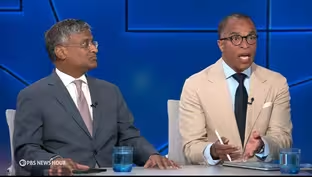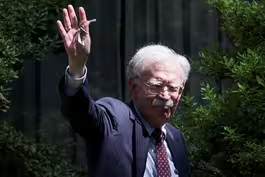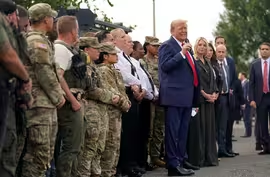
Powell hints at rate cut, but Fed in 'challenging situation'
Clip: 8/22/2025 | 7mVideo has Closed Captions
Powell hints at long-awaited rate cut but admits Fed in 'challenging situation'
In a closely watched speech, Fed Chair Jerome Powell gave the strongest indication yet that the central bank will cut interest rates as soon as September. With inflation ticking up and the job market cooling down, Powell said the Fed was in a “challenging situation.” Amna Nawaz discussed more with Loretta Mester, the former president and CEO of the Federal Reserve Bank of Cleveland.
Problems playing video? | Closed Captioning Feedback
Problems playing video? | Closed Captioning Feedback
Major corporate funding for the PBS News Hour is provided by BDO, BNSF, Consumer Cellular, American Cruise Lines, and Raymond James. Funding for the PBS NewsHour Weekend is provided by...

Powell hints at rate cut, but Fed in 'challenging situation'
Clip: 8/22/2025 | 7mVideo has Closed Captions
In a closely watched speech, Fed Chair Jerome Powell gave the strongest indication yet that the central bank will cut interest rates as soon as September. With inflation ticking up and the job market cooling down, Powell said the Fed was in a “challenging situation.” Amna Nawaz discussed more with Loretta Mester, the former president and CEO of the Federal Reserve Bank of Cleveland.
Problems playing video? | Closed Captioning Feedback
How to Watch PBS News Hour
PBS News Hour is available to stream on pbs.org and the free PBS App, available on iPhone, Apple TV, Android TV, Android smartphones, Amazon Fire TV, Amazon Fire Tablet, Roku, Samsung Smart TV, and Vizio.
Providing Support for PBS.org
Learn Moreabout PBS online sponsorshipAMNA NAWAZ: In a closely watched speech in Jackson Hole, Wyoming, this morning, Federal Reserve Chairman Jerome Powell gave the strongest indication yet that the Central Bank will cut interest rates as soon as their next meeting in September.
With inflation ticking up and the job market cooling down, Powell said the Fed was in a challenging situation, but warned about a potential slowdown in the labor market.
JEROME POWELL, Federal Reserve Chairman: Downside risks to employment are rising.
And if those risks materialize, they can do so quickly in the form of sharply higher layoffs and rising unemployment.
AMNA NAWAZ: Despite intense pressure from the president, the Fed has kept its benchmark interest rates steady for eight months, taking a wait-and-see approach to the impacts of Trump's tariff policy.
But, today, Powell acknowledged those price increases could be more of a one-time shift, rather than a long-term risk.
JEROME POWELL: A reasonable base case is that the effects will be relatively short-lived, a one-time shift in the price level.
Of course, one time does not mean all at once.
It will continue to take time for tariff increases to work their way through supply chains and distribution networks.
AMNA NAWAZ: To help us understand the implications, we're joined now by Loretta Mester.
She's an adjunct professor of finance at the University of Pennsylvania's Wharton School of Business and was president and CEO of the Federal Reserve Bank of Cleveland from 2014 to 2024.
Loretta, welcome to the "News Hour."
Thanks for joining us.
LORETTA MESTER, Former President, Federal Reserve Bank of Cleveland: Thanks for having me on.
AMNA NAWAZ: So let's just begin with your reaction to Chair Powell's speech.
Is that about as close as a Fed chair will come to saying that there will be a rate cut at the next meeting?
LORETTA MESTER: I thought it was very clear that he is open to cutting rates in September.
His view is that policy is still modestly restrictive, meaning that it's putting some downward pressure on inflation, and that the risk on the labor side -- of course, the Fed has a dual mandate, maximum employment and inflation.
His view of the risks on the labor side, that maximum employment mandate, have gone up in terms of higher downside risk to that.
So, with bigger risks there, I think they're open to cutting.
I don't think he laid out a case for a big cut in September or necessarily a whole series of cuts coming after that.
But I do think that he was open to cutting rates in September, really thinking about it as insurance against those downside risk in the labor market.
AMNA NAWAZ: Where do you see the language that indicated we shouldn't plan for additional rate cuts, a series of rate cuts, after September potentially?
Was that more around the uncertainty of long-term policy around tariffs and the impact of other regulatory policies?
LORETTA MESTER: Yes, I mean, I think he did two things.
One, he laid out why we are going to see higher inflation readings in coming months.
And while he basically laid out a case for a why there will be a one-of increase in the price level,he also was very clear that it's up to the Fed to make sure those one-time increases from the tariffs on inflation don't become a more lasting inflation problem.
And then he also said that the labor market was still in a relatively balanced place and that that allows them sort of to be very careful with policy going forward.
And when a chair says careful, I think that means it's not necessarily the start of a large, necessarily every meeting kind of cutting situation.
It's going to be looking at the data that comes in before every meeting and making a determination based on what their evaluation of where the economy is and where it's going meeting by meeting.
AMNA NAWAZ: As you know, the president has long been calling for a rate cut.
He's been critical of Chair Powell.
He was asked about the speech today in the Oval Office and he insisted that Powell was -- quote -- "too late" on rate cuts.
Loretta, given the revisions that we did see on the job numbers last month and Chair Powell's warning today about some of the downside risks ahead, does the president have a point here?
LORETTA MESTER: I don't think they were too late on getting to a place where they can cut.
Remember, they did bring rates down last fall.
And so policy has moved.
Then, when the tariff effects were put on and the on-and-off tariff impacts and the coming what will happen with inflation readings, I think they were right to really take a step back from those cuts and say, we have got to be very cognizant of what's going to happen to inflation, not just today, but where it's going.
And the labor market until the last reading was quite strong.
And it's still -- we still haven't seen an increase in the unemployment rate.
That's because the supply of labor is also coming down, even though firms' demand for labor is coming down.
So the labor market is in balance.
And the chair in his speech pointed out, but it's a curious balance, because it's quite unusual to have both the supply and demand coming down in tandem, so you don't get that change in the unemployment rate.
AMNA NAWAZ: Loretta, I need to ask you as well about, in addition to the fact that the president has been critical of Chair Powell, he's also added Fed Governor Lisa Cook to his sights.
She was appointed by Joe Biden.
A Trump administration housing official has accused her of mortgage fraud.
So the president has said even today that he would fire her if she doesn't resign.
What do you make of these allegations and also this push from the president to oust Lisa Cook?
LORETTA MESTER: Well, I think it's a continual pressure on the Fed because he wants to influence Federal Reserve policy.
And he's been doing similar kinds of pressure on Chair Powell to lower rates.
Now he's trying to find, I think, information on other policymakers, other governors so that he can take action there.
But this has been very persistent.
And the vitriol and language is something that we haven't experienced before.
And it's unfortunate, I think, because what we have learned over time, and not just in the United States, but across countries, is that you really want the Central Bank to make monetary policy really focused on the goals that the government has given them, and not really focus on anything other than those goals and making policy appropriately to try to achieve those longer term goals.
AMNA NAWAZ: Loretta Mester, former head of the Federal Reserve Bank of Cleveland, thank you so much for joining us.
LORETTA MESTER: Thank you.
Capehart and Ponnuru on the FBI's raid on John Bolton
Video has Closed Captions
Clip: 8/22/2025 | 11m 51s | Capehart and Ponnuru on the FBI's raid on Trump critic John Bolton (11m 51s)
FBI raids John Bolton, former Trump adviser turned critic
Video has Closed Captions
Clip: 8/22/2025 | 6m 50s | FBI raids home of John Bolton, a former Trump adviser turned vocal critic (6m 50s)
Life in Gaza, through the voices of its children
Video has Closed Captions
Clip: 8/22/2025 | 6m 18s | A glimpse of life in Gaza, through the voices of its children (6m 18s)
'Man-made disaster': Famine declared in Gaza City
Video has Closed Captions
Clip: 8/22/2025 | 7m 42s | 'Man-made disaster': Famine declared in Gaza City where half a million face starvation (7m 42s)
News Wrap: Pentagon says troops will carry firearms in D.C.
Video has Closed Captions
Clip: 8/22/2025 | 6m 22s | News Wrap: Pentagon says troops will start carrying firearms in D.C. (6m 22s)
Pastor leading Target boycott on the retailer's response
Video has Closed Captions
Clip: 8/22/2025 | 6m 11s | Pastor leading Target boycott on its impact and the retailer's response (6m 11s)
Providing Support for PBS.org
Learn Moreabout PBS online sponsorshipSupport for PBS provided by:
Major corporate funding for the PBS News Hour is provided by BDO, BNSF, Consumer Cellular, American Cruise Lines, and Raymond James. Funding for the PBS NewsHour Weekend is provided by...
















